- Latest articles
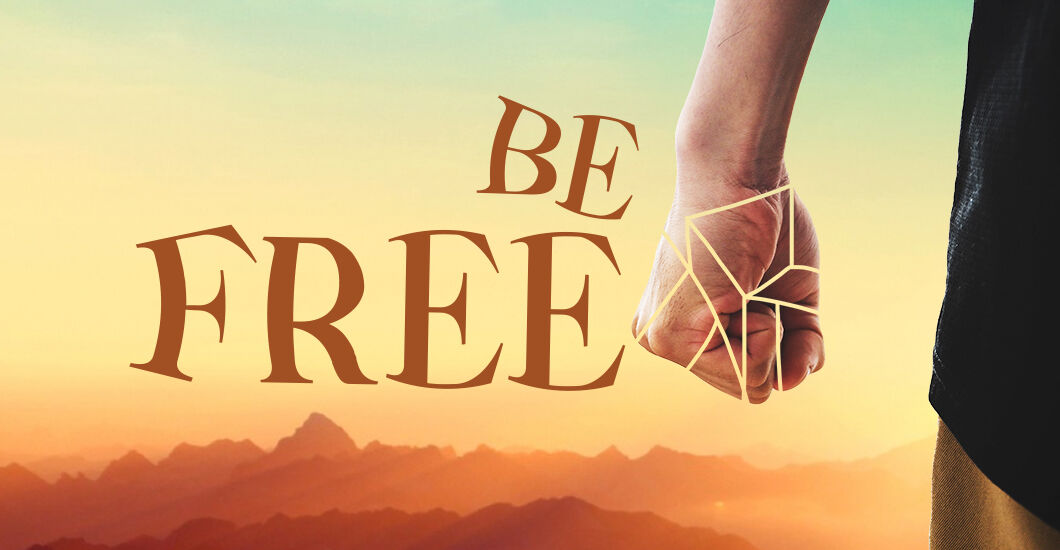
It isn’t easy to say ‘I forgive’ and truly forgive until you do this…
“For freedom Christ has set us free.” (Galatians 5:1)
I’m sure the majority of people would be aware that forgiveness is at the very heart of the Christian message, but many would be surprised to learn that not forgiving somebody can result in physical pain. I know this from personal experience. Several times, I have witnessed the power of the Holy Spirit in healing this terrible, often paralysing, sickness.
Not a Cliché
The first words Jesus spoke, as He was dying on the Cross, were words of forgiveness (Luke 23:34). His loving sacrifice was the moment that mankind had awaited, – to set them free from sin and death. Forgiveness was again on His lips when He met His disciples after He rose from the dead, giving them the power to grant it on His behalf (John 20:19-23). When the Apostles asked Him how to pray, Jesus responded with a prayer allowing us to address God as ‘Our Father’, and asking Him to ‘forgive us our trespasses (sins) as we forgive those who trespass (sin) against us’ (Matthew 6:12). If we expect forgiveness ourselves, we must forgive others (Matthew 5:23-26; 6:14).
Unforgiveness can be likened to a clenched fist. A clenched fist is tense, and is often clenched in anger. It is really only fit for one thing; to hit somebody, or at least to be ready to. If that fist does hit somebody, then it is a fair assumption to expect one back, creating more animosity. If the fist is clenched, it is not open. An open hand is able to receive but if it is closed and clenched it is not possible to accept what may be offered. Alternatively, when we open our hands so we can receive, we are also able to give what we receive.
When He Sets Free
As I prayed about this at Mass, I had an image of a walking stick, and realized that when we do not forgive, it hinders our walk through life. After Mass, a man approached as we chatted outside, asking us to take a picture of him outside the church. When I noticed his walking stick, I had a sense that his sickness was caused by unforgiveness. As the conversation continued, he began to tell me about his past, concluding with a request to keep him in my prayers, since he was suffering with a bad back.
I invited him to pray with me immediately because Jesus wanted to heal him, but it would require something from him. Intrigued and open, he agreed, asking what would be required. I told him that he would need to forgive the people he had just mentioned and anybody else who had injured him. I could see him struggling internally, so I encouraged him with the assurance that he didn’t have to rely on his own strength to forgive. If he forgave in the name of Jesus, then Jesus would empower him, lead him and set him free. His eyes lit up as he whispered, “With my Lord’s strength, yes, I can forgive.”
I led him in a prayer, which ended by praying for the healing of his back by laying hands on the problem area (Mark 16:15-18). I told him to do what Jesus said and claim the healing by giving thanks to God in the belief that he had received it, (Mark 11:22-25). This was on Friday evening.
On Sunday, he sent me a text message, “Praise the Lord, Jesus has healed my back.” I praised the Lord indeed, thanking Him with all my heart. I was particularly struck by this detail. We had asked for the healing on the Friday by the power and merits of the Cross. The answer was received on the third day, Sunday, the day of Resurrection.
C.S. Lewis once wrote, “People think forgiveness is a lovely thing until they have something to forgive.” It is important to know that forgiveness is an act of the will; it is something we choose. That is not to say it is an easy choice, as often it can seem like the hardest, most painful decision in the world to make, but when we face everything in the Name of Jesus, ‘through Him, with Him, and in Him’, we learn that ‘with God nothing will be impossible’ (Luke 1:37). It is essential that we ask ourselves if there is anybody in our lives that we need to forgive. Jesus teaches us, “Whenever you stand up to pray, if you hold anything against anyone, forgive them, so that your Father in Heaven may forgive you your sins’ (Mark 11:25). Therefore, we must bring everything to Jesus and allow Him to set us free, because “If the Son sets you free, you will be free indeed.” (John 8:36).
'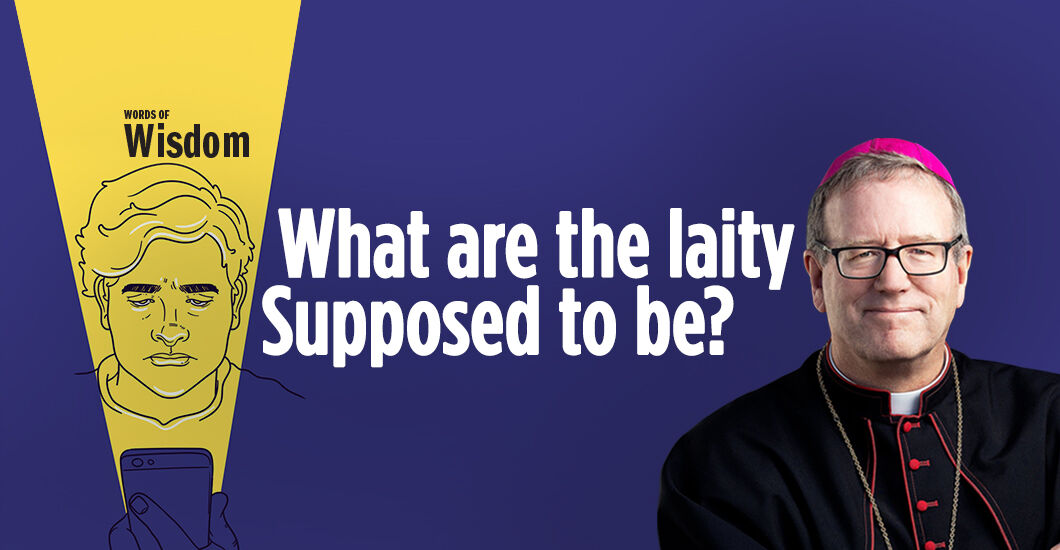
I like to watch old movies. Over the past several months, I’ve watched (or re-visited) a number of Alfred Hitchcock thrillers, some screwball comedies from the thirties and forties, and a couple of film-noir classics. Last week, over the course of three evenings, I managed to get through the three hours and forty minutes (yes, you read that correctly) of the Charlton Heston version of the Ten Commandments from 1956. With delight, I took in the still marvelous technicolor, the over-the-top costumes, the wonderfully corny faux-Shakespearean dialogue, and the hammy acting that is, one might say, so bad that it’s good. But what especially struck me was the sheer length of the film. Knowing that it required a rather extraordinary act of attention on the part of its audience, it is astonishing to remember that it was wildly popular, easily the most successful movie of its time. It is estimated that, adjusted for inflation, it earned a box office of roughly two billion dollars. Would moviegoers today, I wondered, ever be able to muster the patience required to make a film like the Ten Commandments equally popular today? I think the question answers itself.
The coming together of daunting length and popularity then put me in mind of a number of other examples of this combination from cultural history. In the nineteenth-century, the novels of Charles Dickens were so sought after that ordinary Londoners waited in long lines for chapters as they were published in serial form. And let’s face it: not a lot happens in Dickens novels, by which I mean very few things blow up; there are no alien invasions; no snappy one-liners uttered by the heroes before they blow away the bad guys. For the most part, they consist of lengthy conversations among fascinating and quirky characters. Much the same can be said of the novels and stories of Dostoevsky. Though there is indeed a murder and a police investigation at the heart of the plot of The Brothers Karamazov, for the vast majority of that famous novel, Dostoevsky arranges various characters in drawing rooms for pages and pages and pages of dialogue on matters political, cultural, and religious. During that same period, Abraham Lincoln and Stephen Douglas engaged in a series of debates on the vexed issue of slavery in America. They spoke for hours at a time—and in an intellectually elevated manner. If you doubt me, look up the texts online. Their audiences were not cultural elites or students of political philosophy, but rather ordinary Illinois farmers, who stood in the mud, gave their full attention, and strained to hear the orators’ unamplified voices. Could you even begin to imagine an American crowd today willing to stand for a comparable length of time and listen to complex presentations on public policy—and for that matter, could you imagine any American politician willing or able to speak at Lincolnian length and depth? Once again, the questions answer themselves.
Why this look back at modes and styles of communication from another age? Because by contrast ours seem so impoverished! I certainly understand the value of social media and I readily use them in my evangelical work, but at the same time, I am acutely aware of how they have lessened our attention span and capacity for sophisticated conversation and real advance toward the truth. Facebook, Instagram, YouTube, and especially Twitter specialize in flashy headlines, misleading titles, simplistic characterizations of an opponent’s position, sound bites in place of arguments, and mean-spirited rhetoric. Just dip into the comment boxes on any of these sites, and you’ll immediately see what I mean.
A favorite technique on social media is to take a phrase or even a single word of a person’s argument, wrench it out of context, give it the worst possible interpretation, and then splash one’s outrage all over the internet. Everything has to be fast, easily digested, simple to understand, black and white—because we have to get clicks on our site, and it’s a dog-eat-dog world. What worries me is that an entire generation has come of age conditioned by this mode of communication and hence is largely incapable of summoning the patience and attention required for intelligent engagement of complex issues. I noticed this, by the way, in my nearly twenty years of teaching in the seminary. Over those two decades, it became increasingly difficult to get my students to read, say, a hundred pages of St. Augustine’s Confessions or of Plato’s Republic. Especially in more recent years, they would say, “Father, I just can’t concentrate that long.” Well, the auditors of the Lincoln-Douglas debates could, and so could the readers of Dickens, and so even could those who sat through The Ten Commandments sixty-some years ago.
So as not to end on a down note, permit me to draw your attention to what I consider a real sign of hope. In just the last couple of years, there has been a trend in the direction of long-form podcasts that are attracting huge audiences of young people. Joe Rogan, who hosts one of the most popular shows in the country, speaks to his guests for upwards of three hours, and he gets millions of views. In the past year, I have appeared on two podcasts with Jordan Peterson, each one in excess of two hours and featuring pretty high-level discourse and both has reached just shy of one million views.
Perhaps we’re turning a corner. Perhaps young people have tired of vituperative sound bites and superficial pseudo-intellectualism. To encourage this trend, I would like to invite all of you to use much less social media—and maybe pick up The Brothers Karamazov.
'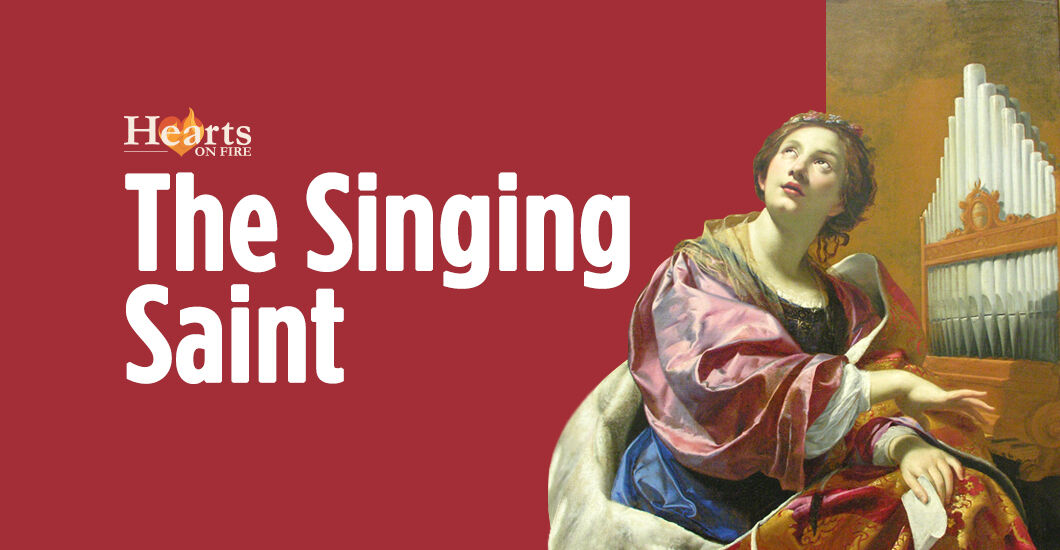
The Christian writer Tertullian wrote that “the blood of the martyrs is the seed of the Church.” A sterling example of that truth is the third century martyr, Cecilia. Her name is recited daily in the canon of the Mass, and she remains to this day as one of the great Saints of the early Christian era.
Hers is an inspiring yet bloody story. Despite having vowed her chastity to Jesus, her wealthy parents arranged a marriage with a young suitor named Valerian. You can imagine the young man’s surprise when, on her wedding night, Cecilia informed him that she had not only taken a vow of chastity but that her virginity was under the watchful protection of her guardian angel.
Amazingly, her husband agreed to respect her vow and even promised to embrace Christianity, but he had a condition: he wanted to see her guardian angel. Her counter-request was that he travel to the third milestone on the Appian Way and there receive baptism at the hands of Pope Urbanus. After emerging from the waters of baptism and returning home, Valerian did indeed see the angel sitting beside Cecilia.
Eventually, her husband’s brother Tiberius was also converted,and the brothers regularly buried Christians who were murdered almost daily by the local Roman prefect.
Eventually they were arrested and imprisoned for refusing to offer sacrifices to the gods, but they managed to convert their jailer before losing their lives in martyrdom.
Not long after, Cecilia herself was arrested and condemned to death. She miraculously survived a night amidst intense fire meant to suffocate her. Then an executioner struck three separate blows to her neck in a failed attempt to decapitate her. Left bleeding, Cecilia survived three days, preaching all the while to those who gathered round her and who collected the blood that flowed from her wounds.
Her relics, and those of her husband, brother-in-law, and the converted jailor, are kept in Rome’s Church of St. Cecilia.
Her body was found incorrupt when it was exhumed in 1599 and because on her wedding day she sang hymns to Jesus in her heart, Cecilia is the patron saint of musicians. We celebrate her feast on November 22.
'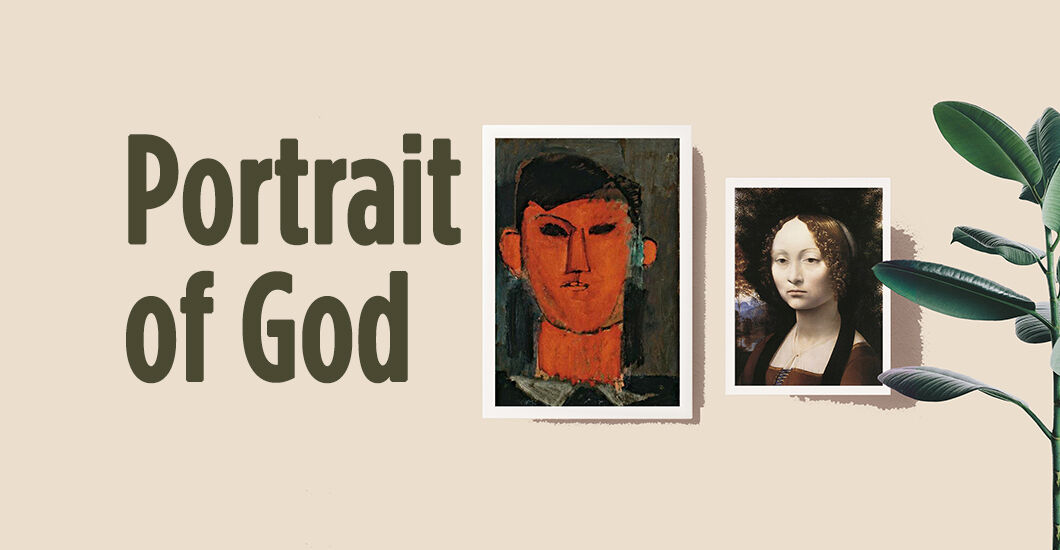
There is something intimate about drawing someone’s portrait, about studying his or her facial features, discovering subtle details, and sensitively capturing an expression that is one of a kind. Modern facial recognition technology testifies to how utterly unique each individual’s face is. Like DNA or a fingerprint, your image is yours and yours alone. And yet, while each person’s image is altogether unique, we are all patterned after one exemplar. The book of Genesis says that God made man and woman in His image. God is an artist. This is one of the first things we learn about Him in Scripture. God makes portraits. He makes self-portraits.
If every person is made in God’s image, why do we all look and act so different? God is boundless. No single individual can ever capture the entirety of who God is. That is why He made so many of us. Picasso painted at least 14 self-portraits over the course of his lifetime. Each self-portrait is undeniably distinct. However, there is some measure of truth about Pablo expressed in all of his pieces. Likewise, each person is a unique yet truthful representation of God’s eclectic character.
Sin is iconoclasm. When Adam and Eve defied God in the garden, something happened to their God-given image. Likewise, something happens to our image whenever we wrong God or others. Sin is the smudging of wet paint on canvas. It is the disfigurement of God’s beautiful artwork. Sin makes God less recognizable in us, and therefore less recognizable to ourselves. But thankfully, God, like a typical artist, is stubbornly devoted to His artwork. This is why the Son, the perfect Image of God, took on the medium of flesh.
Christ came to renew, to repaint our disfigured image. By modeling a life of love, wisdom, and forgiveness, Christ reminds us what God looks like. With His blood Christ begins scrubbing away our defects, smoothing out smears, and filling in the gaps. Through the interior design of the Holy Spirit, the original masterpiece regains clarity once again. The life of a Christian is one of ongoing art restoration. Every artist knows how tedious the creative process can be, but the outcome is always worth it.
When passing through Washington DC, it is essential to visit the National Gallery of Art. There you will find appreciators from around the globe crowding around one piece in particular. It is a modestly sized portrait of a mysterious young lady painted by Leonardo da Vinci. With such few of his originals remaining, it is among the most precious works of art today. On the reverse side of the portrait reads the inscription, “Virtutem Forma Decorat” (beauty adorns virtue). The image of God is a spiritual reality. It is made visible by the conduct of our character. When we allow our lives to conform with God’s brushstrokes, beauty follows in its most genuine and lasting splendor. God is the painter par excellence. His eye is keener than da Vinci’s, and his hands softer than Caravaggio’s. Your beauty surpasses anything in the Louvre, because you are His original artwork. Next time you make the sign of the cross, remember that you trace God’s signature on you. †
'
“The world is thy ship, not thy home” is a famous quote by Saint Therese of Lisieux. In fact we are all on a journey to our final destination…
As a child, my mother once assured me that God only takes a soul home when it is most ready. This was such a comforting thought to me that I tucked it away in my heart, clinging tightly to it for consolation when the loss of loved ones occurred throughout my life. The most wondrous example I witnessed of this encouraging statement was that of my dear husband in the final days of his life.
Beginning of the End
Chris had been battling brain cancer for over three years—a horrific disease in which he was only expected to live a year, with continuous, nearly insufferable treatment. It was a joyful and painful three year journey—full of hopeful highs and an equal number of devastating lows. When Chris’ cancer began spreading with no hope of containment, and having exhausted all options, Chris made the heart-wrenching decision to discontinue treatment and enjoy the time he had left, leaving it all in God’s hands. This decision marked the beginning of the end. The heartache I felt at the thought of losing him after such a courageous battle we were hopeful he could continue to fight was nearly beyond what I could bear. I placed Chris on hospice with a vow to him that our children and I would honor his one wish and care for him at home until the end.
Terrified at the thought of such an enormous undertaking of which I had no training or experience to do, I put my full faith in God, pleading for His mercy and guidance. The downpour of heavenly graces and blessings which we received by this desperate petition would see our family through Chris’ final weeks.
Louder than a Whisper
With the discontinuation of treatment, Chris’ precious brain began to suffer the effects of the rapidly spreading disease. Slight memory loss turned into considerable memory loss, and then the seizures began—all within a few weeks. One evening, with little warning, Chris suffered a grand mal seizure. After seating himself on the sofa following a focal seizure, my children and I gathered around as we sensed something was wrong. I took his hand in mine, and as I did, I felt his entire body begin to stiffen. His dark brown eyes rolled back in his head and he began shaking uncontrollably—he then let out a loud cry of pain.
In a state of disbelief and terror at what we were witnessing, I attempted to calm my children and seek strength and divine assistance for my husband in the only way I knew how—prayer. As I held my Chris, I softly lead our children through the Lord’s Prayer—following it with a prayer to Our Lady, whom he was so devoted to. A few moments later Chris’ seizure began to subside. He lay there, motionless, unable to see the terrified, tear stained faces surrounding him. When he opened his eyes after fully regaining consciousness, he began to scan his surroundings with a look of confusion. His eyes met mine and I gently assured him that he was fine—and immediately sought to find out what he wanted from us in that moment for assistance.
Barely able to communicate, and in nothing louder than a whisper, Chris replied with the words, “I…want…God.” It was at that very moment, I knew. I knew God was preparing him, and I knew my faith-filled husband was longing for home—his eternal life. Although devastated over the realization that his end was drawing near, I felt a sense of overwhelming gratitude for this precious grace of acceptance. Chris was no longer burdened with the agonizing thought of leaving his family behind in this world. He had been unbound from that cross and given an immeasurable gift of peace as well as a deeper comprehension of what splendor the next life holds. My precious, faithful husband was ready. The following weekend, while peacefully resting in bed and surrounded by family as we softly prayed the Rosary, our beloved Chris passed away. It was the Lord’s Day, and Feast of the Holy Name of Mary. And this beautiful soul was most ready.
'
It isn’t easy when anxiety attacks but you are not alone…
I knew what was coming next as soon as I heard the beat echoing inside my chest, each beat faster than the next. My heart raced as I tried to remember to exhale. A knot formed in my stomach as if it knew I needed something to hold on to, shallow breath after shallow breath. The dreaded domino effect in my body was a familiar yet unwelcome guest. Here was Anxiety trying to take over again. It seems like the more I fought her, the stronger she would get. My attention kept fueling her until I realized that Peace, the guest I did want to entertain, had already left.
A High Fever
Anxiety is a topic I have hesitated writing about. I am not a mental health professional. I am not qualified to give advice on these matters. But I am a person with an experience, and I am qualified to share my story. For me, anxiety has been like a fever…a symptom that shows up to tell me something somewhere needs attention. At times, the symptom, like a high fever, needs direct help to get through the situation, but other times, just knowing “this too shall pass” has been enough to allow me to sit in the discomfort and wait for God to comfort me. Time and time again, He has brought light and healing to these areas of my heart that felt isolated from Him.
The first time I felt His healing hand soothe my fears away, I thought I was healed; I thought I would never have to experience that sense of dread again. So, when it happened again, I was confused. Did I do something to make Him take His favor back? Did I fail to pass the test? No… There is just much more that needs to be healed. Each time I experience anxiety becomes an opportunity for me to call on God to help me. Each time, I invite Jesus to rule in my heart and bring me His Peace.
One Big Lie
On one of those occasions, I learned how the enemy of my soul was using my fears against me. Every time I got close to identifying a pattern of sin in my life, the fears would sneak in. The fear was so crippling I could not even hear with my mind the lie that I was choosing to believe in. It felt like an automatic reaction until I became still instead of running away. I remembered the prophecy of Simeon to Our Lady: “…and you yourself a sword will pierce so that the thoughts of many hearts may be revealed” (Luke 2:35). Through Mary, I asked Jesus to reveal to me the thoughts of my own heart.
The wind started to blow, and, in my mind, I saw huge idols made of sand start to dissipate, one by one. Each lie was made of nothing, and against God’s truth, could not stand. But what did I find on the other side? Not happiness, but a deep pain in my heart. I came upon my sin, a deep-rooted tree that had remained hidden but had bad fruit popping up all over my life. Things that seemed disconnected all converged in this one big lie: “God does not see you; You are alone in this life.”
The sight of all the sin that had emerged from this one lie caused pain, but there was no fear. The grace of repentance poured in with each tear…“where sin increased, grace overflowed all the more” (Romans 5:20). Scripture after scripture filled my mind as the Spirit interceded for me, and Truth filled my heart. I felt seen. I felt loved. I knew I was and would never be alone.
Like I said at the beginning, I am not a mental health expert, so I do not know what you need to help you confront your fears. But I do know God loves each and every one of us. This encounter with God’s love healed something else in me. One of the most crippling aspects of anxiety is when we fear the anxiety itself. The experience is so unsettling and uncomfortable that we do everything possible to avoid going through it again. But I know now there is nothing to fear, for it is in our darkest moments that the light will shine the brightest. He has conquered death. His love is greater than our fears.
“In all these things we conquer overwhelmingly through Him who loved us. For I am convinced that neither death, nor life, nor angels, nor principalities, nor present things, nor future things, nor powers, nor height, nor depth, nor any other creature will be able to separate us from the love of God in Christ Jesus our Lord” (Romans 8:37-39).
'
When you toss and turn sleeplessly, have you ever felt God saying, “We need to talk and now you have time”?
On one of my pastoral visits to a local elementary school, a young grade 5 girl said to me that she was told by an adult in her life that, with respect to this pandemic, “God is taking a vacation”. Although there is something hopeful in the claim—in so far as vacations come to an end and the vacationer returns and takes care of outstanding business—I certainly would not frame it like that. It is a rather dangerous claim to make, for God does not leave us alone even for an instant. In fact, we have God’s undivided attention at every instant of our existence, and children above all need to understand that. It is not possible for a limited human being to give undivided attention to more than one person at the same time, but God can give everyone His undivided attention simultaneously, because God is unlimited.
A Pure Gift
It is remarkable to consider what it means that we have God’s undivided attention at every instant of our existence; for it means He loves each one of us as if there is only one of us, that is, as if you are the only one for Him to love. It is as if everything in the universe was created ultimately for you alone, that all this exists to sustain and serve you—the atmosphere of the planet, the law of gravity and all the other laws of physics, the cycles and the order of nature, etc. In fact, if you or I really knew how much God loves us, we would die of joy. And this life is precisely about learning to be loved like that.
That means allowing ourselves to be loved like that, for we tend not to allow that for ourselves because we have a very uncompromising and narrow sense of justice for ourselves and thus don’t see ourselves as deserving of that love, so we choose not to open ourselves to it. But His love for us is not a matter of justice; of course, no one deserves to be loved like that; for one cannot earn the right to be brought into being if one does not exist. And so although His love for me is not a matter of justice, it is a matter of pure gift. After all, God’s justice has been revealed, in the Person of Christ, as absolute mercy.
There is a relationship between that Divine love and how we understand ourselves. A person only really knows himself to the degree that he knows how much he is loved by God, and so the more we allow ourselves to “be loved like that” (as if there is only one of us), the deeper will be our own self-understanding; for we will begin to see ourselves as He sees us. If we don’t see ourselves through His eyes, that is, as He sees us, then we are left to see ourselves as we are seen by others.
The problem with this, however, is that others rarely if ever see us as we really are—especially if those in our lives do not look at us through God’s eyes—and if they don’t see us as we really are, they do not love us as we ought to be loved. When the world looks at you, it does not see an inexhaustible mystery; rather, it sees an object, something to be valued according to its utility. But there is nothing mysterious about tools. On the other hand, when God sees you, He sees a genuine mystery, because each human person has been created in the image and likeness of God and God is the unutterable mystery. Hence, each human person is an inexhaustible mystery whose secret lies hidden within the depths of the inexhaustible mystery of God.
The Universe Within
We have two interiors: 1) a physical interior, and a 2) spiritual interior. A surgeon has access to the physical interior, but that does not give him access to the spiritual interior. Only you and God can access your spiritual interior. In fact, God dwells always in the deepest region of that interior. The way to begin to come to awareness that you are known by God is to enter into that “universe within”. That is what it means to place ourselves in the presence of God. Few words are necessary within that space; it is enough to simply repeat over and over: “Lord Jesus Christ, Son of God, have mercy on me, a sinner”.
The more time we spend within that space, without distraction, the more we will come to sense that we are being watched, that we have someone’s attention. That is a very positive and enlightening experience; for we begin to see ourselves as someone worthy of attention. We begin to see ourselves as persons, rather than mere individuals. But it begins with entering into the “universe within”, and that experience makes all the difference in the world, because most of us for most of our lives have been reduced to objects, but we know ourselves to be “subjects”—persons of intrinsic worth. This “objectification” is in many ways the source of a great deal of personal anger and feelings of alienation, but as we spend more time within that interior where the Lord awaits us, the less alienated we will begin to feel and the more peaceful our life becomes.
'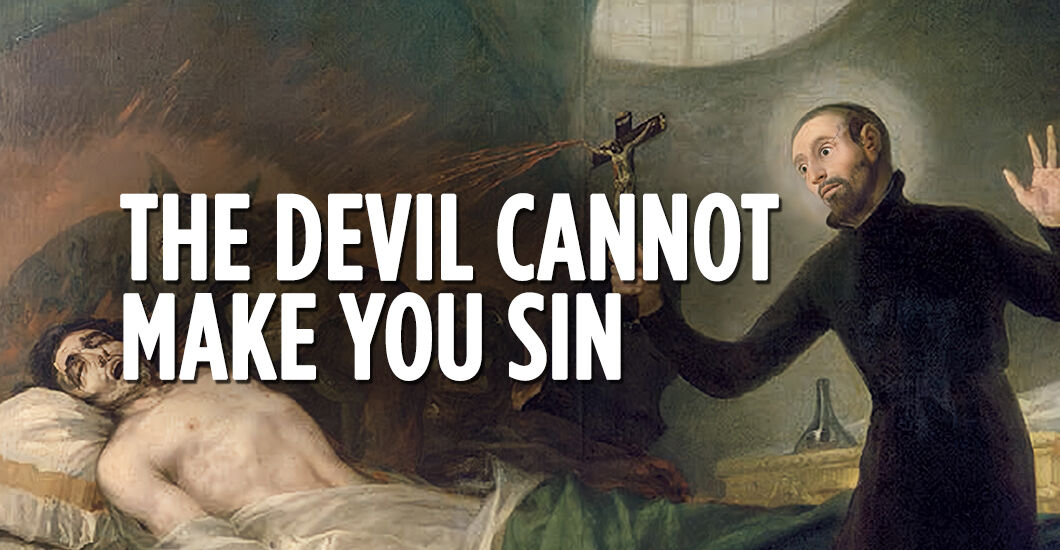
A Special Interview with renowned exorcist Father Elias Vella OFM, from the Archdiocese of Malta, who shares his incredible ministerial journey
As an exorcist for the Diocese of Malta and at healing and deliverance retreats all over the world, I have been blessed to witness the healing and deliverance of many souls from demonic possession, oppression and temptation.
I come from a small Catholic country, the Island of Malta in the Mediterranean Sea. As a Theology lecturer in the seminary for 24 years, I did not always believe in the existence of the Devil because I was influenced by Dutch and German theologians who doubted the reality of Satan. However, when I became involved in the Catholic Charismatic Renewal, people began to come to me with problems that were connected with the occult, satanism and the Devil. I didn’t know what to do. I could see it wasn’t all in their mind and I wanted to help them, so I went to the bishop and asked if I should send them to him. He told me to go and study the issue and discern what God was calling me to do. The more I examined the issue, the more I could see the workings of the Devil and I no longer doubted. I was interested, not for myself, but because people were in need, so the Bishop asked me to become the exorcist for the diocese.
Possession is when a demon takes control of someone, so that they are no longer free to think for themselves. Their will, emotions and intelligence become subject to demonic influence. However, a demon cannot take over the soul and cannot force someone to sin because you can only sin if you are free to do as you will, you know what you are doing and you want to do it. During an exorcism, a person can make sinful gestures, for example call out blasphemies or break a rosary, but these are not sins because the person is not in control of their body.
In an exorcism, the exorcist (who is a specially trained priest) orders the demon to leave the body of the person in the name of God and by the power of the Church. It is often a struggle because the demon does not want to leave the body where he has made a home, but God is more powerful than the Devil, so he must leave in the end. Not all demonic attacks involve possession.
Although, I have personally encountered many cases of demonic possession requiring exorcism, this is because I am an exorcist, so they come to me. It is actually very rare. Many people who think they need exorcism do not. They need other spiritual, psychological and physical help. Although I often visit other countries, I can only perform an exorcism outside my diocese with the permission of the local bishop. If I don’t have that, then I can pray a deliverance prayer, but not the exorcism liturgy. Every exorcism is unique. The Devil is intelligent and cunning, so varies his techniques to elude and deceive us.
These are a couple of the people that have been successfully delivered from possession during an exorcism.
During a healing Mass in the Czech Republic, I invited the congregation to wash their faces with holy water to remind them of their need for purification. After washing her face, this girl took a crucifix and started to beat me with it. I couldn’t respond violently, but when others had restrained her, we offered her an exorcism. It was very difficult because her father had consecrated her to the Devil in a satanic ceremony where she was smeared with the blood of animals.
In Brazil, a fragile 16-year-old girl went into a trance during the Mass. When we prayed over her, she became so violent that she could break a chair with no effort and a strong man couldn’t hold her. Her possession had begun with superstitious use of idols, but despite the difficulty, she was able to be delivered with the aid of Our Lord in the Eucharist.
We are all tempted or oppressed. Even Our Lord and Our Lady were tempted many times not to do the will of the Father, but did not succumb. Oppression is when the Devil targets our weak spots with an attack. It is not the same as possession. Often, someone who is spiritually attacked also suffers from psychological problems. It isn’t always easy to understand what originates from a spiritual problem and what is a psychological problem.
Often, it needs a multi-pronged response. Prayer, grace from the sacraments, therapy and appropriate medical help may all be needed to fully recover. I pray for both healing and deliverance. The sacraments are the most powerful weapons against the Devil’s attacks. The Devil fears the sacraments, particularly the Sacrament of Penance because it directly confronts sin and the temptation to sin. When penitents acknowledge and renounce their sins, and ask for forgiveness from a loving God, they are rejecting the deceptions of the Devil who tries to entice us into thinking that our sins are not wrong; or that we don’t need forgiveness; or that God does not love us; or that He would not mercifully forgive us. Receiving absolution delivers a fatal blow to the Devil’s hold over us. This is why we must not neglect regular Confession.
The Eucharist is a powerful weapon against the Devil because Our Lord is giving Himself to us in humility and love. These are two things that Devil make the devil suffer. He is the opposite, full of pride and hate. Because Satan has an insatiable desire for power, he will never understand how God could offer Himself to us. Therefore, when we receive Our Lord in the Eucharist, or adore Him in front of the Eucharist, the Devil flees, because He cannot bear it and wants to escape. So, when there is no exorcist to help people who are disturbed, they should seek the presence of the Lord in the Eucharist.
Protection Prayer
Lord God almighty, grant me Your grace by the merits of the passion, death and resurrection of Your beloved Son, Jesus Christ. I accept Him as my Lord and Savior. Protect me, my family, and all the surroundings I live in, by the Precious Blood of Jesus. I renounce and bind all the evil influences that disturb me, by the powerful name of Jesus and by the power of His Precious Blood and chain them at the foot of the Cross. Amen.
'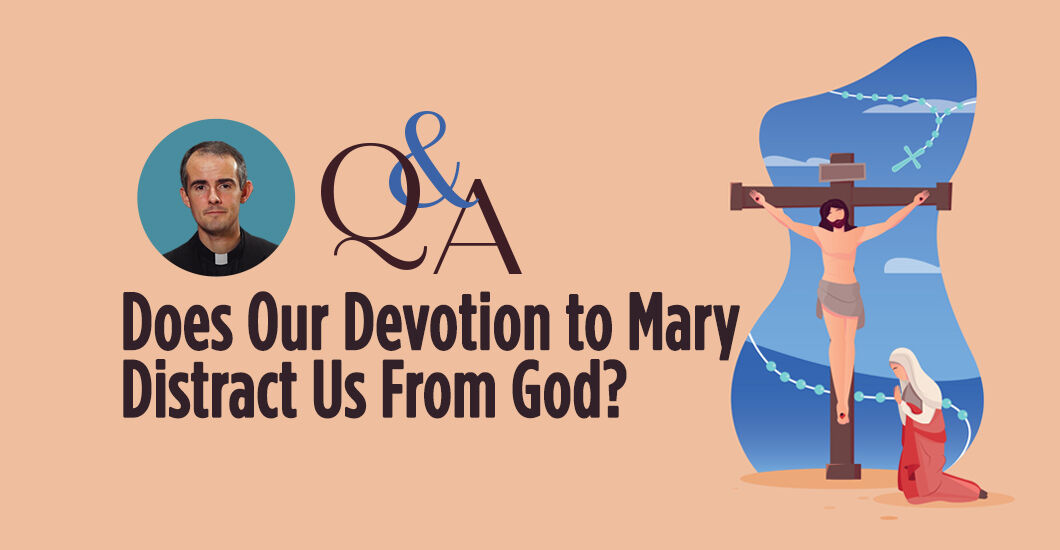
Q –I know that we are supposed to have a devotion to Mary, but sometimes I feel like it distracts me from my relationship with Jesus. I just don’t feel very close to Mary. How can I have a deeper devotion to Our Lady without taking away from my love for Jesus?
A – In my own life, I struggled with that very question. I grew up in an area of the United States that was mostly Protestant, and none of my Protestant friends ever had a devotion to Mary. One time when I was a teenager, I got into a conversation with someone in a checkout line in Wal-Mart, and when she found out I was studying to become a priest, she asked me why Catholics worship Mary!
Of course, Catholics don’t worship Mary. God alone is worthy of worship. Rather, we honor Mary with the highest honor. Since she was closest to Jesus on earth, she is closest to Jesus in Heaven. She was the perfect follower of Jesus, so imitating her will help us to follow Jesus more faithfully. We ask her to pray for us, just as we might ask our own parents or a friend or a priest to pray for us—and Mary’s prayers are far more effective, for she is far closer to Christ!
To grow in a healthy devotion to Mary, I recommend three things.
First, pray the Rosary daily. Pope John Paul II said that the Rosary is “looking at the life of Jesus through the eyes of Mary.” It is a Christ-centered prayer, loving Him through the Heart that loved Him best (the Immaculate Heart). The Rosary changed my life—I took it on as a Lenten penance when I was a teen…and I dreaded it every day. To me, it seemed so boring…all those repetitive prayers. But once Lent was over, I found that I couldn’t put it down. The repetition was no longer boring but calming. I imagined myself in the scenes of Christ’s life and encountered Him there.
Second, consecrate yourself to Mary. Saint Louis de Montfort has a rich 33-day consecration to Mary, or you can use the more recent “33 Days to Morning Glory” consecration program. When we offer Mary our lives, she cleanses and purifies us, and then presents our lives beautifully to Her Son.
This is how Saint Louis answers your question in True Devotion to Mary: With Preparation for Total Consecration: “If then, we establish solid devotion to our Blessed Lady, it is only to establish more perfectly devotion to Jesus Christ, and to provide an easy and secure means for finding Jesus Christ. If devotion to Our Lady removed us from Jesus Christ, we should have to reject it as an illusion of the devil; but so far from this being the case, devotion to Our Lady is, on the contrary, necessary for us…as a means of finding Jesus Christ perfectly, of loving Him tenderly, of serving Him faithfully.”
Finally, turn to Mary in your daily needs. One time I was leading a wedding rehearsal for a very holy couple when we realized, to our horror, that they had forgotten the marriage license! I couldn’t marry them without the civil license, but it was too late to get it before the wedding the following day. I brought the bride and groom into the sacristy and broke the news to them—I couldn’t marry them unless a miracle happened. They were devastated! So, we prayed to Our Lady, who herself was married and who has a special love for engaged couples. We entrusted this problem to Her—and She performed a miracle! A parishioner happened to know a town clerk who came in early on her day off to give them a marriage license and the marriage took place as planned. She is a mother—we should bring our Mother all our problems and concerns!
Never forget—true devotion to Mary doesn’t lead us away from Jesus, it leads us to Jesus through Mary. We can never honor Mary too much because we can never honor her more than Jesus honors her. Come to Mary—and trust that She will lead you to her Son.
'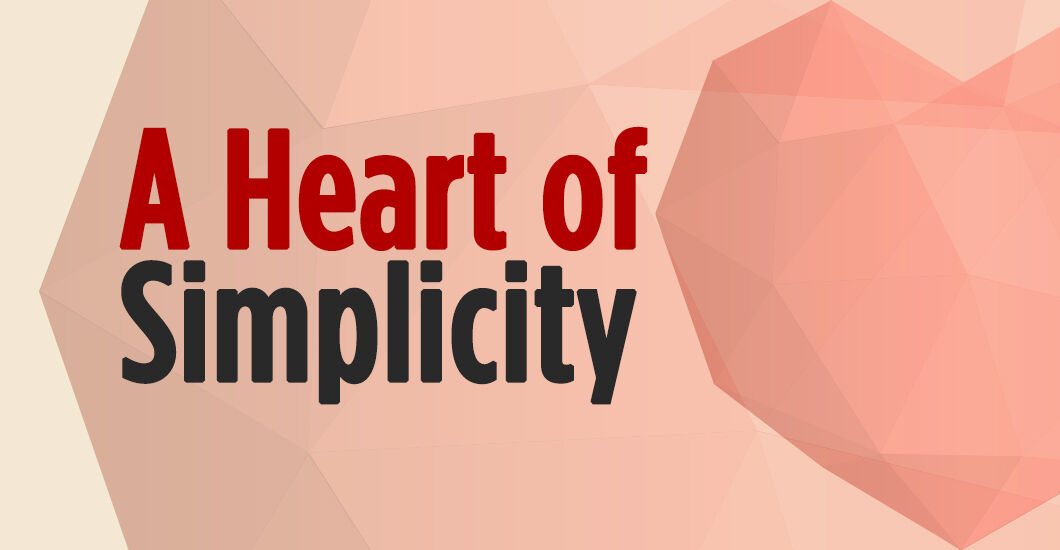
We slide into our pew with one minute to spare, and I have a feeling that Mass is going to be a struggle for our family. By the time the priest finishes reading the Gospel, I’m frazzled and overwhelmed. Then during the Creed—as I am stifling down the urge to shout, “We are not taking any more trips to the bathroom!”—my busy three-year old licks the pew while my seven-year old tells me he is thirsty again and asks what con-sub- stan-tial means. Going to Mass is not always easy. I feel discouraged and even ashamed for not paying better attention at Mass. How am I supposed to worship God while juggling the many demands on my attention? The answer: a heart of simplicity.
I used to think the phrase “active participation at Mass” meant absorbing the deep meaning of every single word I hear. But in this season of life, having focus is a luxury. Now as I raise my children, I begin to understand that God does not hold back His invitation or His Presence just because my life gets messy. He loves me and accepts me as I am—mess and all—even amidst the chaos of a hectic Mass experience. If we remember this, you and I can take simple steps to prepare our hearts for God’s supreme gift of Love in the Eucharist.
Discover a Short Phrase
I am often overwhelmed by the number of words I hear at each Mass. My attention falters, and I struggle to follow many of the spoken parts. If you navigate this challenge too, know that you and I are still called to listen and be engaged at Mass. How? Simplify. Listen for a short phrase that catches your attention. Reflect on it. Repeat it. Bring it to Jesus and ask Him to show you why it is important. Hold this phrase in your heart throughout the Mass and let it become an anchor for your attention while you attend to your family responsibilities. Your open heart is a landscape for Christ’s grace.
Gaze With Love
Love does not always need words. Sometimes a simple glance can communicate an ocean of love. If words wash over you, engage your heart and direct your love to the Lord by focusing your eyes on a Crucifix or a Station of the Cross. Reflect on the details you see: Christ’s face, His crown of thorns, His bleeding heart. Each detail you intentionally take in draws your heart closer to Jesus and prepares you to receive Our Lord’s immense gift of Love in the Eucharist.
Bring Your Heart
If all else fails, bring yourself to Jesus as an offering of love. The Lord knows your intentions and your true desires. If you feel frazzled and unfocused by things beyond your control, you can still come before the Lord with a heart willing to worship Him, to receive Him and to love Him. Stir the affections of your heart and repeat “Here I am Lord. I choose you. Transform my heart!”
Our Lord rejoices every time we encounter Him at Mass, regardless of our circumstances. Jesus was human—He got tired, He got interrupted. Our Lord understands the mess of life! And even in the midst of it, He wants to give Himself to you in the Eucharist. So next time you go to Mass, give Jesus your willing heart, your “yes” to come before Him as you are. Christ’s love is bigger than whatever family chaos is happening in your pew.
'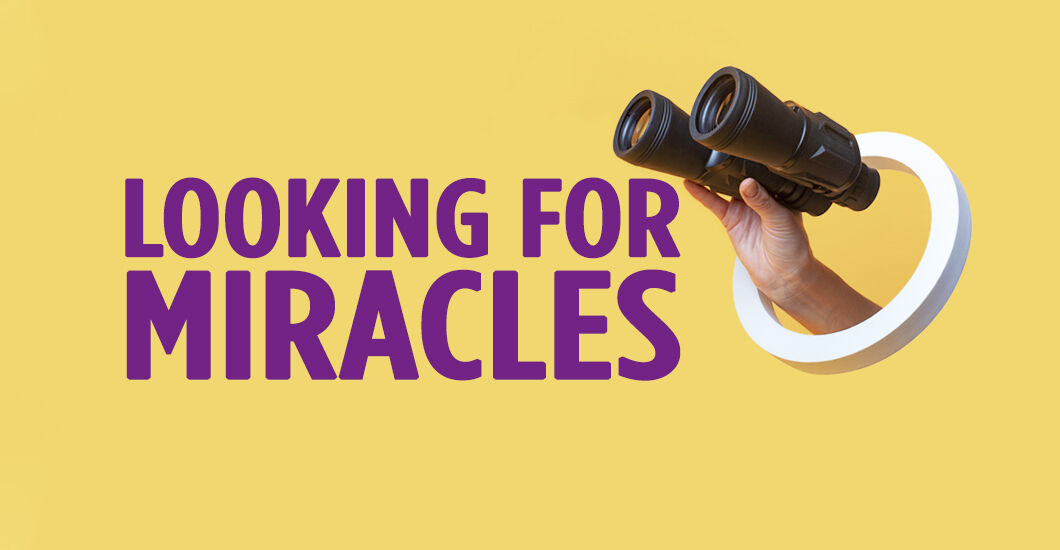
They happen every day but we seldom notice…
I want to tell you two stories of grace, wonderful grace that came just when I needed it, in fact, just when I asked for it. I think these experiences of grace were miraculous, and before I share them with you I’d like to reflect a bit on miracles.
People will tell you that miracles don’t come on demand… and they are right. Miracles don’t come on demand. But Jesus tells us to ask, and promises that if we ask, we will receive (Matthew 7:7). I firmly believe that when we ask, God hears us and gives us what we truly need.
We need to acknowledge that miracles are a mystery that transcends human understanding. We get glimpses, we have intuitions, but we can never fully understand or explain the workings of God’s grace manifested as “miracles.”
I Got Nothing!
Many scoff at the notion that “if we ask” we will “receive.” “I asked and got nothing,” some will say. That adds to the mystery. Jesus was a miracle worker, but He didn’t heal everyone in Israel. Millions go to Lourdes, but few miracles are documented. Can we say that people don’t ask “right” or don’t really need what they ask for? No! Only God reads the heart; we cannot judge.
But my experience and that of many others confirms that Jesus spoke the truth when He told us to ask and expect a response from God our Father. So, I believe in miracles, which are simply manifestations of God’s grace— sometimes in dramatic fashion and sometimes not so much, sometimes so obvious that anyone can recognize them and other times so subtle and disguised as “a coincidence” that only eyes of faith can perceive them.
Miracles should be expected…like children expect their mothers to feed them when they are hungry. But kids can’t control the menu. Mom decides the menu otherwise kids would eat mac and cheese every night. Moms never tire of feeding their children. Similarly with God. He never tires of our requests and like our moms He gives us what we need and not the junk food we want.
Miracles are not God performing tricks so we can brag, “Look what God did for me!” God’s miracles answer the deep longings of our hearts reminding us to always rely on Him. When God grants us miracles, He uses them to point to the grace that is all around us in life’s ordinary moments—each day’s sunrise, a hand extended in apology, a hug of forgiveness, an act of selflessness. Only if we recognize life’s ordinary miracles can we expect to see the extraordinary ones.
Miracles build faith, they don’t replace it. When we are constantly seeing miracles, we don’t need much faith. But when God is silent and obvious blessings are removed, we have an opportunity to live our faith more deeply. That’s why we may see more miracles when we are new in the faith than when we have matured.
Story One
Years ago, my wife Nancy and I taught in a summer Ministry Institute at a large Catholic urban university. Each summer we put on a show of dance and drama which we wrote and rehearsed during the six weeks of the Institute. Our performers were Institute students who came from all over the country and all over the world. After five years of creating these moving and exciting programs we were well-known and respected by Institute students and faculty alike. We cherished this amazing opportunity to impact ministry professionals from all over the world as they learned from us how to use the performing arts as a powerful resource for ministry and education.
But prior to our sixth summer we were told we would not be directing our summer production any longer and were invited instead to teach a course. We accepted, and taught our class, contributed artistically to liturgies, and tried to be as “present” as we could, but it just wasn’t the same. We missed the work, the interaction, the creativity, and the unique contribution we had made each of the previous five summers.
Walking across the campus one day I found myself feeling dispirited about our diminished role. I entered a university building from the south end lamenting to the Lord that I needed some evidence that our presence mattered, that we still made a difference. I walked through the building atrium and by the time I exited the north of the building my prayer was answered. Standing at the top of a long set of steps I saw a car suddenly stop on the street below. With the engine running, the driver jumped out and called my name.
“Oh, Graz,” she said, “I’m so glad to see you. I wanted to tell you how glad I am that you are here at the Institute. You and Nancy make such a difference, it just wouldn’t be the same without you. Thank you for everything you do.” And with that, she hopped back into her car and drove off. “Wow, Lord,” I thought, “that was fast!”
Story Two
Flash forward a dozen years. I am the director of an Archdiocesan office in Chicago. I am having a hard week, feeling discouraged, not sure whether I am doing what God wants me to be doing. I am in the kitchen of our office building, washing my lunch dishes and I pray, “Lord, You used to give me little signs that You were taking care of me, that I was doing Your will…I need one of those signs now.”
The next morning, still despondent, I decide to skip work. It’s summer, the kids are off school, so I announce: “Dad’s playing hooky today. Who wants to go to a Cubs game?” I don’t even know if the Chicago Cubs are in town, but we check and they are, and off we go.
We drop the kids off at one of the gates to stand in line for tickets and head off to park. Parking is always a challenge at Wrigley Field. Either you park very far away and walk, or you pay a fortune in a parking lot. Neither option is realistic—we’re running too late for a long walk and paying an exorbitant parking lot fee would destroy my budget. I make the ridiculous choice to look for street parking.
Impossibly, directly in front of the entry gate there’s a spot at a parking meter. For two dollars I will get a maximum of two hours, which means I will have to leave the park, feed the meter, and return to the game (I don’t realize that leaving and returning is not allowed). As I exit my car, I see a woman on the opposite side of the street getting ready to pull out of her parking spot. That side has no meters! I run to her, explain my situation and ask if she will wait until I pull out so I can take her spot. She happily obliges.
I have got free street parking one minute away from Wrigley Field. Unbelievable! Nancy and I hurry to the children where an even bigger surprise awaits. Our daughter calls excitedly, “Dad,” she says, “we got free tickets.”
“What?” I ask in disbelief.
She explains: “A man asked me and Christopher if we were going to the game. I said yes and he said he was here with a big group and some people didn’t show up, so he gave me two tickets. Then I said, ‘What about my mom and dad?’
‘Oh, your parents are here, too?’ Here you go. Two more tickets.”
Free parking and free tickets to a Cubs game! God gave me my sign.
Objectively, you might say all I got was a little affirmation one time and some freebies the next. However the fact that God graciously provided exactly what I needed just when I asked for it, that was the miracle.
'